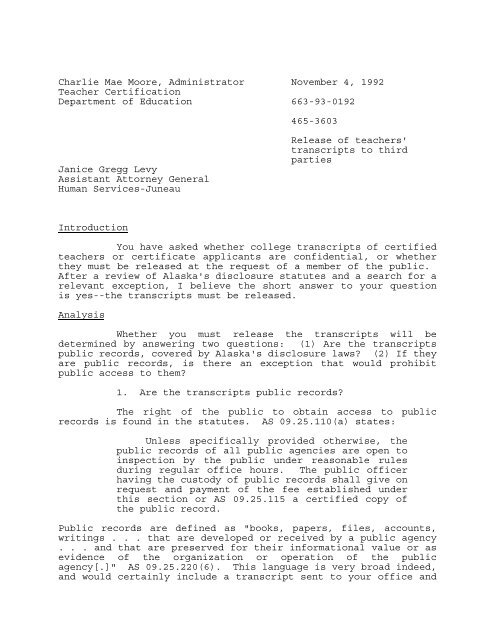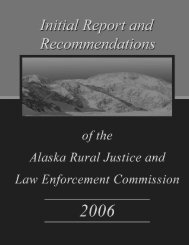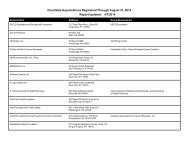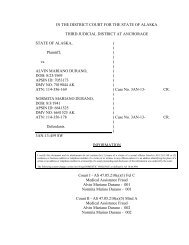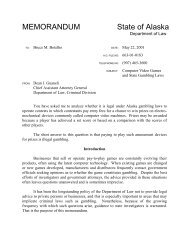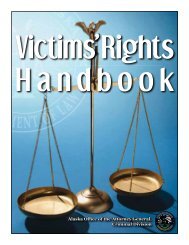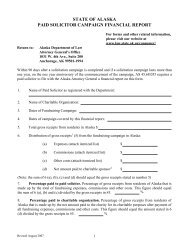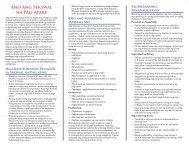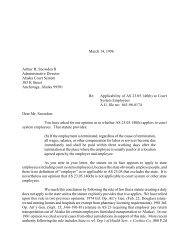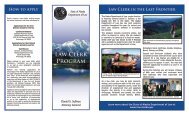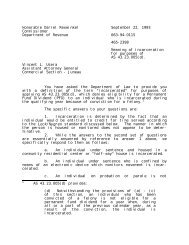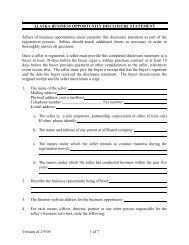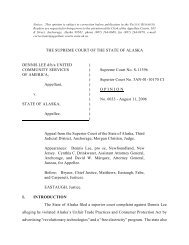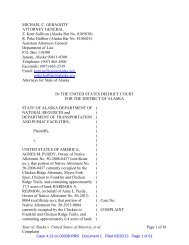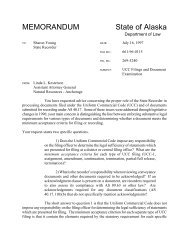Release of teachers' transcripts to third parties - Alaska Department ...
Release of teachers' transcripts to third parties - Alaska Department ...
Release of teachers' transcripts to third parties - Alaska Department ...
You also want an ePaper? Increase the reach of your titles
YUMPU automatically turns print PDFs into web optimized ePapers that Google loves.
Charlie Mae Moore, Administra<strong>to</strong>r November 4, 1992<br />
Teacher Certification<br />
<strong>Department</strong> <strong>of</strong> Education 663-93-0192<br />
465-3603<br />
Janice Gregg Levy<br />
Assistant At<strong>to</strong>rney General<br />
Human Services-Juneau<br />
<strong>Release</strong> <strong>of</strong> <strong>teachers'</strong><br />
<strong>transcripts</strong> <strong>to</strong> <strong>third</strong><br />
<strong>parties</strong><br />
Introduction<br />
You have asked whether college <strong>transcripts</strong> <strong>of</strong> certified<br />
teachers or certificate applicants are confidential, or whether<br />
they must be released at the request <strong>of</strong> a member <strong>of</strong> the public.<br />
After a review <strong>of</strong> <strong>Alaska</strong>'s disclosure statutes and a search for a<br />
relevant exception, I believe the short answer <strong>to</strong> your question<br />
is yes--the <strong>transcripts</strong> must be released.<br />
Analysis<br />
Whether you must release the <strong>transcripts</strong> will be<br />
determined by answering two questions: (1) Are the <strong>transcripts</strong><br />
public records, covered by <strong>Alaska</strong>'s disclosure laws (2) If they<br />
are public records, is there an exception that would prohibit<br />
public access <strong>to</strong> them<br />
1. Are the <strong>transcripts</strong> public records<br />
The right <strong>of</strong> the public <strong>to</strong> obtain access <strong>to</strong> public<br />
records is found in the statutes. AS 09.25.110(a) states:<br />
Unless specifically provided otherwise, the<br />
public records <strong>of</strong> all public agencies are open <strong>to</strong><br />
inspection by the public under reasonable rules<br />
during regular <strong>of</strong>fice hours. The public <strong>of</strong>ficer<br />
having the cus<strong>to</strong>dy <strong>of</strong> public records shall give on<br />
request and payment <strong>of</strong> the fee established under<br />
this section or AS 09.25.115 a certified copy <strong>of</strong><br />
the public record.<br />
Public records are defined as "books, papers, files, accounts,<br />
writings . . . that are developed or received by a public agency<br />
. . . and that are preserved for their informational value or as<br />
evidence <strong>of</strong> the organization or operation <strong>of</strong> the public<br />
agency[.]" AS 09.25.220(6). This language is very broad indeed,<br />
and would certainly include a transcript sent <strong>to</strong> your <strong>of</strong>fice and
Charlie Mae Moore, Administra<strong>to</strong>r November 4, 1992<br />
Teacher Certification Page 2<br />
663-93-0192<br />
included in your files. Thus, the <strong>transcripts</strong> are subject <strong>to</strong><br />
disclosure unless they are covered by an exception <strong>to</strong> the law.<br />
2. Is there an applicable exception that would<br />
prohibit public access<br />
AS 09.25.120 sets out six exceptions <strong>to</strong> the general<br />
rule <strong>of</strong> disclosure, only two <strong>of</strong> which could be relevant <strong>to</strong><br />
teacher <strong>transcripts</strong>: "(4) records required <strong>to</strong> be kept<br />
confidential by a federal law or regulation or by state law;" and<br />
"(5) <strong>to</strong> the extent the records are required <strong>to</strong> be kept<br />
confidential under 20 U.S.C. 1232g and the regulations adopted<br />
under 20 U.S.C. 1232g in order <strong>to</strong> secure or retain federal<br />
assistance." 20 U.S.C. • 1232(g) is the federal law you brought<br />
<strong>to</strong> my attention. I have discussed it below under "Federal Law,"<br />
and conclude that it does not provide an exception that justifies<br />
nondisclosure.<br />
Federal Law<br />
The <strong>transcripts</strong> you receive from universities are<br />
typically stamped or printed with information advising that<br />
disclosure <strong>of</strong> the transcript <strong>to</strong> <strong>third</strong> <strong>parties</strong> is prohibited by<br />
P.L. 93-380, or the Family Education Rights and Privacy Act <strong>of</strong><br />
1974 (FERPA), 20 U.S.C.S. • 1232(g). This federal law protects<br />
student records, and prohibits the colleges from releasing<br />
student <strong>transcripts</strong> <strong>to</strong> <strong>third</strong> <strong>parties</strong> without the consent <strong>of</strong> the<br />
student. In your hands, however, the <strong>transcripts</strong> are not<br />
"student" records but rather a part <strong>of</strong> a teacher certification<br />
file, and thus not protected by the statute. The law states that<br />
[f]or purposes <strong>of</strong> this section, the term "student"<br />
includes any person with respect <strong>to</strong> whom an<br />
educational agency or institution maintains<br />
education records or personally identifiable<br />
information, but does not include a person who has<br />
not been in attendance at such agency or<br />
institution.<br />
20 U.S.C. • 1232g(a)(6) (emphasis added). The teachers for whom<br />
you keep records are not in attendance at your agency. Therefore<br />
I do not believe they can seek protection under this law.<br />
The question was examined in Klein Independent School<br />
Dist. v. Mat<strong>to</strong>x, 830 F.2d 576 (5th Cir. 1987), where a teacher<br />
argued that disclosure <strong>of</strong> her college transcript would violate
Charlie Mae Moore, Administra<strong>to</strong>r November 4, 1992<br />
Teacher Certification Page 3<br />
663-93-0192<br />
her privacy rights based on FERPA. The court found that the<br />
statute was enacted <strong>to</strong> prohibit a school from releasing records<br />
<strong>of</strong> its students, and concluded that it did not protect the<br />
records <strong>of</strong> an employee <strong>of</strong> a school district where the teacher was<br />
not a student.<br />
Because she is an employee and not a student <strong>of</strong><br />
the institution requested <strong>to</strong> disclose her<br />
transcript, she does not fall within that class <strong>of</strong><br />
people for whose benefit FERPA was created. Ms.<br />
Holt is not a "student" and her college transcript<br />
is not an "education record" protected from<br />
disclosure pursuant <strong>to</strong> FERPA's provisions.<br />
Klein at 579. The Washing<strong>to</strong>n Supreme Court reached a similar<br />
result, stating that FERPA "protects student records, not teacher<br />
records." Brouillet v. Cowles Publishing Co., 791 P.2d 526<br />
(Wash. 1990).<br />
Your agency, <strong>of</strong> course, is not an employer <strong>of</strong> the<br />
teacher, and you may wonder if that distinguishes you from the<br />
Klein and Brouillet results. Again, because teachers are not "in<br />
attendance" at your agency and because they submit the<br />
<strong>transcripts</strong> <strong>to</strong> you in their capacity as teachers, not students,<br />
they do not fall within the class <strong>of</strong> people FERPA was intended <strong>to</strong><br />
protect. Therefore, the certification files you maintain are not<br />
required <strong>to</strong> be kept confidential under 20 U.S.C. • 1232(g), and<br />
the general rule <strong>of</strong> disclosure applies.<br />
State Law<br />
A provision <strong>of</strong> state law could also override the<br />
general rule <strong>of</strong> disclosure and prohibit inspection <strong>of</strong> public<br />
records, and there are some express statu<strong>to</strong>ry provisions <strong>to</strong> that<br />
effect for certain records. There is not such a provision,<br />
however, covering certification files.<br />
Finally, the <strong>Alaska</strong> Constitution protects the right <strong>of</strong><br />
privacy in article I, section 22. A teacher could argue that<br />
release <strong>of</strong> a transcript is violative <strong>of</strong> that right. The type <strong>of</strong><br />
information that implicates the right <strong>of</strong> privacy is information<br />
"which a person desires <strong>to</strong> keep private and which, if<br />
disseminated, would tend <strong>to</strong> cause substantial concern, anxiety or<br />
embarrassment <strong>to</strong> a reasonable person." Falcon v. <strong>Alaska</strong> Public<br />
Offices Comm'n, 570 P.2d 469, 479 (<strong>Alaska</strong> 1977). The right is<br />
not absolute, however, and the document may still have <strong>to</strong> be
Charlie Mae Moore, Administra<strong>to</strong>r November 4, 1992<br />
Teacher Certification Page 4<br />
663-93-0192<br />
disclosed. The agency must apply a balancing test <strong>to</strong> determine<br />
whether the degree <strong>of</strong> intrusion outweighs the public's interest<br />
in disclosure. Id. at 476-78.<br />
It is highly unlikely that a teacher has a right <strong>of</strong><br />
privacy in the transcript sent <strong>to</strong> your <strong>of</strong>fice for purposes <strong>of</strong><br />
teacher certification. Even assuming, however, that such a right<br />
does exist, it is almost certain that the public's interest in<br />
knowing the qualifications <strong>of</strong> public school teachers outweighs<br />
the teacher's interest in keeping the transcript private. This<br />
was the result reached in Klein Independent School Dist. v.<br />
Mat<strong>to</strong>x, 830 F.2d 576 (5th Cir. 1987), where a similar balancing<br />
test was applied. The court found that disclosure <strong>of</strong> a<br />
transcript did not rise <strong>to</strong> the level <strong>of</strong> "unwarranted invasion <strong>of</strong><br />
personal privacy" and that even if it contained some embarrassing<br />
information, "the public must have full and complete information<br />
concerning the teachers who serve the public in educating their<br />
children." Id. at 581.<br />
Conclusion<br />
The standard for disclosure <strong>of</strong> public records in <strong>Alaska</strong><br />
is set out in the statutes, and construed by the courts as a<br />
strong policy favoring inspection <strong>of</strong> public records. Only where<br />
an exception can be found is the agency permitted <strong>to</strong> withhold the<br />
record. I cannot find an applicable exception, and thus I<br />
believe that AS 09.25.110 - 09.25.120 require you <strong>to</strong> disclose<br />
teacher <strong>transcripts</strong> upon request. If you have any further<br />
questions, please let me know.<br />
JGL/bap


